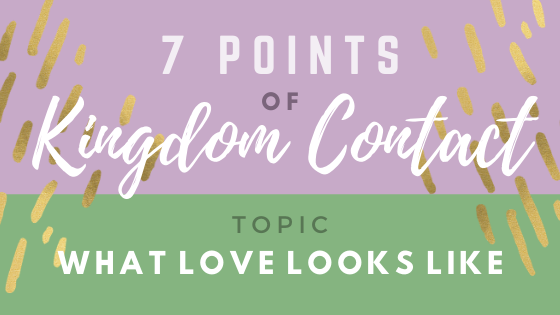The Lord shows us and tells us what love looks like. In describing love, two of the words Paul uses in 1 Corinthians 13 are: Patient and Kind. When these words are mentioned at all, most of us think to ourselves that putting these things into practice is difficult…on a regular day. When challenging circumstances and personal struggle are added in, being patient and kind reach another level of difficulty.
What adds even more layers to our inability to be patient and kind with those around us is when we decide that we are justified in why we can’t be. We convince ourselves that a person doesn’t deserve our patience and that there aren’t enough reasons to be kind to them. We decide that we’re ok with loosing patience or being unkind to someone who isn’t kind to others or isn’t kind to us. We say to ourselves, and maybe others, that because we’re “fed up,” it’s time to lose patience and understandable if kindness no longer shows up in particular interactions.
It’s during these difficult situations when distinguishing between loving feelings and loving actions should be considered. Feeling dislike or not feeling love towards someone must not be the determining factor in what a person experiences from me. How I feel cannot direct who I am. The feelings I have are a helpful indicator of what’s happening in my own heart. It’s a way for me to know my hurt, my joy, what needs to be faced, what my reality currently is. Feeling hurt and therefore making it harder to be patient is very easy to justify. Being hurtful to someone and loosing my patience isn’t something I can justify simply because I’m hurt. How I feel is how I feel. What I do is what I do. They are two separate things.
When there is a raging fire on the inside, it seems almost impossible to be patient and kind on the outside. We may even exist with unkind thoughts that fuel the fire towards another. The good news is that we don’t have to feel a certain way to do a certain thing. Our actions are decisions. Our feelings just show up. Feelings happen and do not require an apology. They require attention so that they don’t disrupt inner peace and potentially, external peace. An unkind act or word towards another that comes from feeling impatient might actually hurt more than what originally caused the heartache. Regret and guilt, on top of hurt and anger, equals no fun.
What helps a person show kindness and patience unconditionally is different for everyone. The starting place might be to have your own plan that helps avoid an action you wish you could take back. Maybe the plan includes being kind in the face of not wanting too. A decision could be made in this moment to be patient, especially when it’s difficult. What should certainly be part of the plan is to be patient with yourself. These plans might not always be carried out, but living with the intent to love at all times could significantly decrease the amount of times impatience happens. The reality to embrace is that I choose what people experience from me. It is essentially the only thing I can control.
Love is patient and kind. Simple. Not easy.

